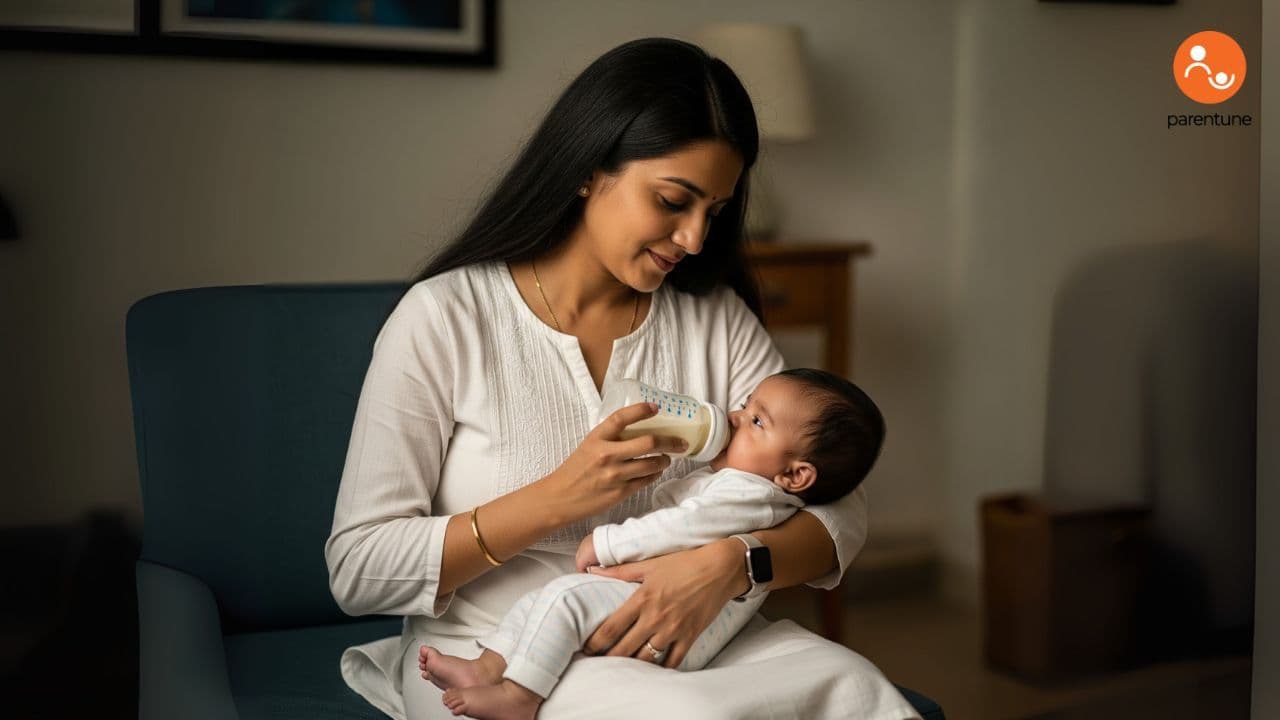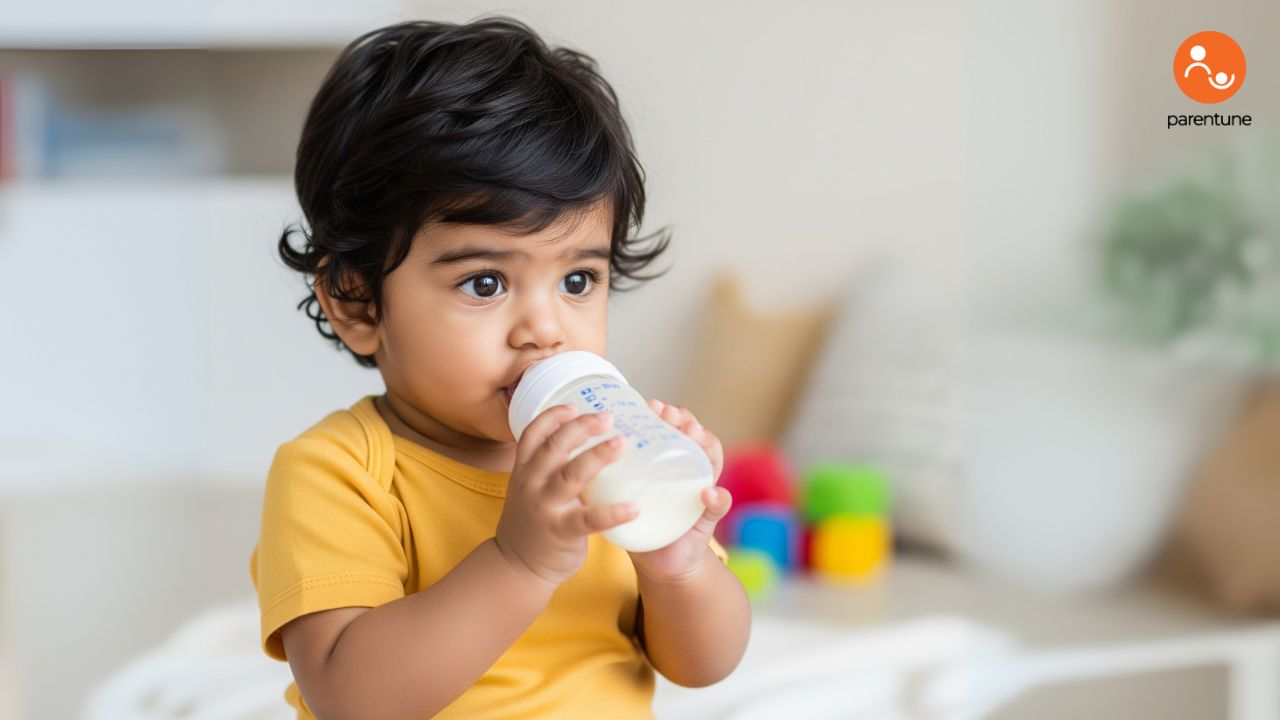cognitive-development
When Do Babies Hold Their Own Bottles? Signs That Say “I’ve Got This!”

Published: 14/07/25
Updated: 14/07/25
Some milestones happen quietly. Not with a bang, but with a bottle.
It’s mid-morning. You’re finally sipping a lukewarm cup of tea, one eye on your baby, the other scanning unread messages. And then it happens.
Tiny fingers curl around the bottle. No fanfare. No warning.
Just a baby declaring — silently but clearly — I want to do this myself.
So when does this moment come?
And more importantly, what does it really mean?
Let’s unpack the signs, the science, and the surprising systems behind this underrated milestone — so you know what to watch for, what to support, and when to just… let go.
Is There a “Right Age” to Hold the Bottle?
There’s a range — not a deadline.
Most babies begin holding their own bottle between 6 and 10 months.
But here’s the nuance.
It’s not about hitting a specific week on the calendar. It’s about the convergence of three systems:
-
Motor development (hand, wrist, and arm coordination)
-
Cognitive readiness (understanding cause and effect)
-
Mouth-muscle strength (jaw stability and sucking control)
A 7-month-old with strong hand coordination may take charge earlier than a 9-month-old who's still mastering wrist rotation.
This isn’t a race. It’s choreography.
And your baby sets the tempo.
You might find these interesting:
What Needs to Click First? The Pre-Bottle Milestones
Milestones stack. Like Lego blocks.
Before bottle-holding becomes a thing, babies usually show signs of:
-
Improved neck and head control — often seen by 3–4 months
-
Reaching and grasping objects — typically around 4–5 months
-
Sitting with support — somewhere near 6 months
Each skill is a foundation. Think of them as prerequisites — like passing a driving test before hitting the highway.
If your baby can sit supported, grab toys, and bring things to their mouth? The bottle-holding moment might be right around the corner.
The Moment of Takeover: Signs Your Baby is Ready
Independence announces itself in small ways.
Look for these signals:
-
Grabbing the bottle mid-feed
The first sign is often a curious clutch — hands exploring, not controlling. -
Bringing objects to their mouth
If they’re constantly gumming toys, teething rings, or your phone, they’re building mouth-hand coordination. -
Sitting up with minimal help
Upright posture supports arm movement — bottle-holding rarely starts when babies are flat on their backs. -
Trying to mimic you during feeding
Babies learn through watching. They’ll try to imitate your movements — even if it starts as more spill than sip. -
A little frustration when you don’t let go
That tug on the bottle isn’t random. It’s a nudge. “Let me try.”
Also worth reading:
Should You Encourage It—or Wait?
Support is not the same as speeding things up.
There are three ways parents usually respond:
-
Hands-off encouragement
You hand over the bottle, support their arms if needed, and let them explore. -
Guided practice
You hold the bottle together, like training wheels for feeding. -
Wait-and-watch
You continue feeding them fully until they insist on more control.
All three are valid. The best path is the one that feels attuned to your baby’s rhythm — and your family’s rhythm.
At Parentune, we’ve seen parents in our community take all three routes — and all of them end up with confident, bottle-holding babies when the time is right.
What If They’re “Late” to Hold Their Bottle?
Development is not a checklist. It’s a story.
If your baby hasn’t held their bottle by 10 months, it’s worth observing other factors:
-
Are they using both hands equally?
-
Do they show interest in self-feeding?
-
Are they gaining weight and feeding well otherwise?
In most cases, delayed bottle-holding isn’t a red flag — it’s a personality quirk.
Some babies just prefer the comfort of being fed.
Some are focused on crawling, babbling, or solving the mystery of the ceiling fan.
If other motor milestones are on track, there's little cause for concern.
Still unsure? Platforms like Parentune offer expert-backed checklists and real-parent anecdotes — so you can get peace of mind and practical advice in one place.
Related reads:
Should You Let Your Baby Always Hold Their Own Bottle?
Holding is a skill. Drinking responsibly is another.
There’s a distinction here:
-
Learning to hold the bottle = excellent
-
Always bottle-feeding alone = risky
Why?
-
Babies can accidentally choke if left unattended
-
Prolonged bottle-feeding while lying flat can cause ear infections
-
Leaving the bottle in their mouth as they fall asleep may lead to baby bottle tooth decay
So yes, encourage independence — but within safe boundaries.
Hold space. Not just the bottle.
Bottle Holding vs Cup Drinking: Is One Better?
Independence has stages, not shortcuts.
By the time babies start mastering bottle-holding, you’ll soon be thinking about transitioning to a sippy or open cup.
Experts generally recommend:
-
Starting to introduce trainer cups around 6–9 months
-
Gradually weaning off bottles between 12–18 months
So while your baby’s newfound grip is worth celebrating, it’s not the endgame — just the start of self-feeding milestones.
Ways to Support the Skill (Without Pressure)
Environment shapes ability. Repetition builds mastery.
Here’s what helps:
-
Use lightweight, easy-to-grasp bottles
Chubby bottles or those with silicone sleeves help tiny hands hold better. -
Offer supported practice while sitting upright
Think high chair or propped lap position — not lying down. -
Model and mirror
Feed your baby while making eye contact. Let them see how you hold the bottle. -
Celebrate effort, not perfection
If the bottle slips, smile. If they spill, laugh. This is not a test — it’s a rehearsal.
Final Thought: Holding a Bottle Isn’t Just a Motor Skill
It’s a declaration. A tiny act of autonomy.
When a baby grabs the bottle, it’s not just about hands or hunger.
It’s about ownership. Exploration. A gentle step into the world of doing things on their own terms.
And for parents?
It’s the beginning of a new phase — where we learn to support without steering.
That’s why having spaces like Parentune — where you can share what worked, ask what didn’t, and hear what no one tells you — is invaluable. Because behind every bottle moment is a story. And a village.
The milestone is small. The shift is big.
From being fed to feeding themselves, this one move marks the slow unfolding of selfhood. And as always in parenting, the real growth is mutual.
Be the first to support
Be the first to share


